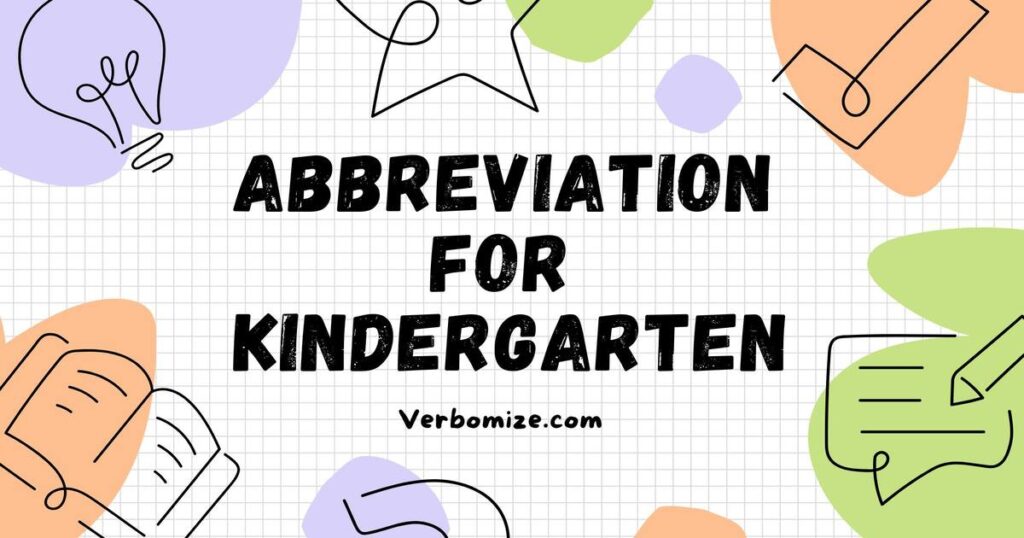The abbreviation for Kindergarten is something many parents and educators encounter often, but do you really know what it means or why it’s used? Whether you’re filling out a form or navigating a school brochure, understanding this simple shorthand can make a world of difference in streamlining communication.
In this article, we’ll dive into the significance of the abbreviation for Kindergarten and why it’s essential to know. Stick with us, and you’ll not only get the answers you’re looking for but also discover interesting facts along the way that you never knew you needed!
What is the Common Abbreviation for Kindergarten?
In everyday conversations and educational discussions, the most common abbreviation for Kindergarten is simply K. This abbreviation is widely recognized and used in informal contexts. It’s often used to describe the first year of schooling in the K-12 education system.
However, in more formal situations, especially in school registration forms or official documents, you might come across the abbreviation Kdg. This is a more structured version of the abbreviation and is commonly used in educational settings.
What Does the Abbreviation for Kindergarten Mean?
The abbreviation for Kindergarten—whether K or Kdg.—refers to the educational level children enter at around age 5. This is the first year of formal schooling that lays the foundation for further academic and social development.
- K is the informal abbreviation, widely used in day-to-day communication.
- Kdg. is the formal abbreviation, which is more often seen on paperwork, such as school forms, educational registration documents, or official school communications.
In essence, both abbreviations serve the same purpose, but Kdg. is typically reserved for official and academic contexts, while K is more commonly used in casual conversations and educational discussions.
Understanding Kindergarten: Definition and Origin
The term Kindergarten itself comes from the German language, where it literally translates to “children’s garden.” The concept of Kindergarten was founded by Friedrich Fröbel in 1837 in Germany. Fröbel believed in the importance of early childhood education and saw play-based learning as a critical method for children to develop emotionally, socially, and intellectually.
Initially, Kindergarten served as a nurturing environment where children learned through exploration, creativity, and social interaction—ideas that still form the foundation of modern early childhood education today.
The word “Kindergarten” has since spread worldwide, with variations in its use depending on the country. For example, in many English-speaking countries like the United States, it typically refers to the first year of formal schooling, usually at age 5. In other regions, it may refer to a more general form of early childhood education that includes preschool years before formal schooling begins.
How to Pronounce the Abbreviation for Kindergarten
While the abbreviation K is simple to pronounce (“kay”), Kdg. follows the pronunciation of the full word, Kindergarten. Phonetically, Kindergarten is pronounced as kin-der-gar-ten, with the emphasis on the first syllable “kin.”
If you are using Kdg. in a formal context, it’s important to pronounce it just like the full word Kindergarten to maintain clarity and accuracy.
The Shortest Abbreviation: “K” – When & Why It’s Used
The K abbreviation for Kindergarten is the shortest and most widely used version of the term. In casual contexts, especially within the United States, K is synonymous with Kindergarten. For example, parents and teachers might casually refer to a child starting Kindergarten as “going to K.”
This informal abbreviation is often seen in:
- K-12 education: This term refers to the full spectrum of education from Kindergarten (K) through 12th grade, with K standing for Kindergarten.
- School directories: In educational systems, K is often used to denote the Kindergarten grade level.
- Informal conversations: Teachers and parents alike may use K in conversations about education.
Is There an Acronym for Kindergarten?
While the terms K and Kdg. are abbreviations, they are not acronyms. The key difference is that an acronym forms a new word from the initial letters of a phrase, such as NASA (National Aeronautics and Space Administration). However, both K and Kdg. are simply shortened versions of the word Kindergarten, and they don’t form new words.
Though Kdg. might look like an acronym, it’s simply a shortened form of Kindergarten, commonly used for clarity and brevity in official documents.
Synonyms for Kindergarten: What Other Words Are Used?
Several synonyms or closely related terms to Kindergarten are used depending on the region and educational system. Some of the most common include:
- Preschool: In some countries, preschool is synonymous with Kindergarten, though it often refers to a year or two of education before Kindergarten. Preschool programs focus on early childhood development, but Kindergarten is the first formal year of school.
- Nursery School: In the UK and some parts of Europe, nursery school is commonly used to refer to early education for young children, often before they enter Kindergarten.
- Early Learning Programs: These programs aim to prepare young children for formal schooling and focus on child development, including cognitive, emotional, and social growth.
While these terms may overlap, there are subtle differences in their usage based on local educational standards and systems. For example, preschool might refer to education before Kindergarten, whereas Kindergarten specifically refers to the first year of formal education in many countries.
Antonyms for Kindergarten: What’s the Opposite Concept?
The opposite of Kindergarten lies in higher education. Kindergarten is the first year of formal schooling, generally for children around age 5. On the other hand, higher education refers to the education received after secondary school, typically in colleges and universities.
Some antonyms might include:
- Elementary School: While not a direct antonym, elementary school comes after Kindergarten and represents the continuation of a child’s education.
- Higher Education: The education system after the K-12 cycle, including colleges and universities, serves as the next stage after Kindergarten education.
The History Behind Kindergarten Abbreviations and Their Evolution
The use of the Kindergarten abbreviation evolved alongside the spread of the Kindergarten concept itself. Friedrich Fröbel pioneered the idea of Kindergarten in the 19th century, emphasizing the importance of early childhood education for emotional and intellectual development.
In the United States, the introduction of Kindergarten as part of the K-12 education system was largely thanks to Margarethe Schurz, a German immigrant who established the first Kindergarten in Wisconsin in 1856. She was followed by Elisabeth P. Peabody, who played a crucial role in spreading Kindergarten throughout the country.
Over time, as the use of Kindergarten became more widespread, the need for shorthand and abbreviations became apparent, especially for school forms and administrative purposes. Today, we use K and Kdg. to refer to Kindergarten in both formal and informal settings.
When Should You Use the Abbreviation for Kindergarten?
Knowing when to use the abbreviation for Kindergarten depends largely on the context:
- Use “K”: When speaking informally or referencing K-12 education, such as in conversations with parents, teachers, or educational professionals.
- Use “Kdg.”: In formal contexts, such as school registrations, official documents, or when listing class levels on school websites.
It’s important to understand the audience and purpose of your communication. In a casual conversation, saying “My child is starting K this year” would be appropriate, while on a school’s official website, it might be more fitting to use Kdg. to ensure clarity and professionalism.
Examples of Kindergarten Abbreviations in Everyday Use
Here are some examples of how the Kindergarten abbreviation is used in everyday life:
- “My daughter is starting K this fall.”
- “We need to sign up for Kdg. registration next week.”
- “The school’s K-12 program is excellent.”
- “Do you think Kdg. will be too early for him to start?”
As you can see, the K abbreviation is most commonly used in informal conversations, while Kdg. is preferred for formal settings.
Key Takeaways on Kindergarten Abbreviation
In summary, the abbreviation for Kindergarten can be either K (informal) or Kdg. (formal), depending on the context. Both serve to simplify communication about a critical stage in a child’s educational journey, ensuring that discussions about Kindergarten are brief yet clear.
Whether you are writing a school registration form, chatting with a parent about their child’s education, or navigating educational discussions in the K-12 system, understanding when and how to use these abbreviations can make communication more efficient and effective.
Kindergarten is a vital part of early childhood education, offering foundational learning that shapes a child’s academic and social development. By understanding the history, meaning, and usage of the Kindergarten abbreviation, you can navigate the education landscape with greater ease and confidence.

Jone Smith is an experienced blogger and content creator behind Verbo Mize. With a passion for storytelling and insightful commentary, Jone brings a wealth of knowledge on diverse topics. His expertise in blogging, combined with a keen eye for detail, makes his work both informative and engaging, offering readers valuable perspectives on a wide range of subjects.







